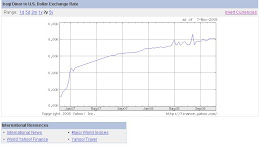Two of my clients have recently invested in property sector of Iraq amid hopes that the situation would get normal within the next six months,” said Muhammad Haris, a local real estate agent, adding: “One of them has bought a hotel and the other has invested in a factory there against a heavy transaction.”
According to him, investors have begun taking interest in real estate sectors of Iraq and India after losing hope in an early recovery of the dismal property situation in Pakistan.
“A large chunk of real estate funds has already got sidetracked to Dubai’s housing sector and the State Bank of Pakistan, in its annual report for 2005, has described this phenomenon as one of the primary reasons for the decline in Pakistan’s foreign exchange reserves,” said Naveed-ul-Hasan, another property dealer in the town.
The Financial Express newspaper of India has published a report from Price water house Coopers LLP, which has recently estimated that as much as $8 billion of private equity will flow into Indian real estate funds over the next 18-30 months.
The report says the Indian property market may get a further boost when Sebi allows real estate investment trusts, or REITs. A committee set up by the regulator has recommended that REITs should be allowed to be set up as mutual funds. While that suggestion is still under consideration, it has allowed high net-worth individuals, both local and foreign, to participate in the market through the private equity route.
Azam Nasir, a local real estate analyst, said Pakistan’s real estate sector had gained tremendous value within two years, which actually was due to take place within five years.
“Therefore no further chance of rapid growth in the real estate sector is possible in the near future,” he said, adding: “Pakistan’s real estate is likely to show lackluster movement over the next five years.”
Real estate agents were expecting another boom in the market with the start of holiday season, which is round the corner at present and a large number of expatriates are to visit Pakistan. There was consensus among the market players that the prices would pick up and a good number of investors, anticipating the arrival of the season, had entered into "biyanas" for underdeveloped phases of Defence Housing Authority with the hope that the market would see further jump in terms of prices in case the expatriate buyers enter the market.
“But the start of Indo-Pak cricket series has wiped out all these hopes and most of the expatriates are preferring to stay glued to the TV screen,” said Wasim Ahmed, a real estate agent in Gulberg area.
According to him, a dull trading activity usually prevails at the market when there are international cricket matches and this is what has happened with the post-Eid market scene in the real estate sector.
The growth in Pakistan’s real estate sector has already been hampered due to heavy clampdown by regulators on housing societies for compliance with regulations and procedures. The drive was initiated to eliminate fake/bogus housing schemes and eventually as many as 86 housing societies have been closed since then.
Then the government is trying to bring the property brokers under the tax net. Immediately prior to the federal budget for 2005/06, there were strong rumors of tax being imposed on the real estate sector, which, however, did not materialize. But it did affect the real estate sector of the country.
Similarly, allegations of misappropriations in land dealings in Defence Housing Authority and subsequent blacklisting of 14 major property brokers as well as suspension of the management committee also shook investor confidence in general in the recent past.(Source)Daily Times

